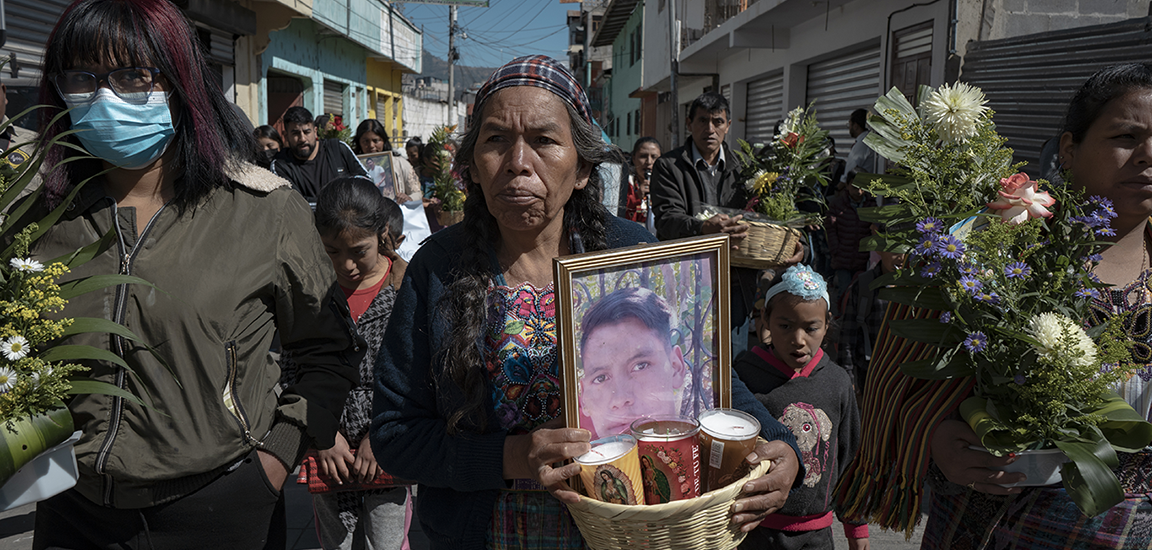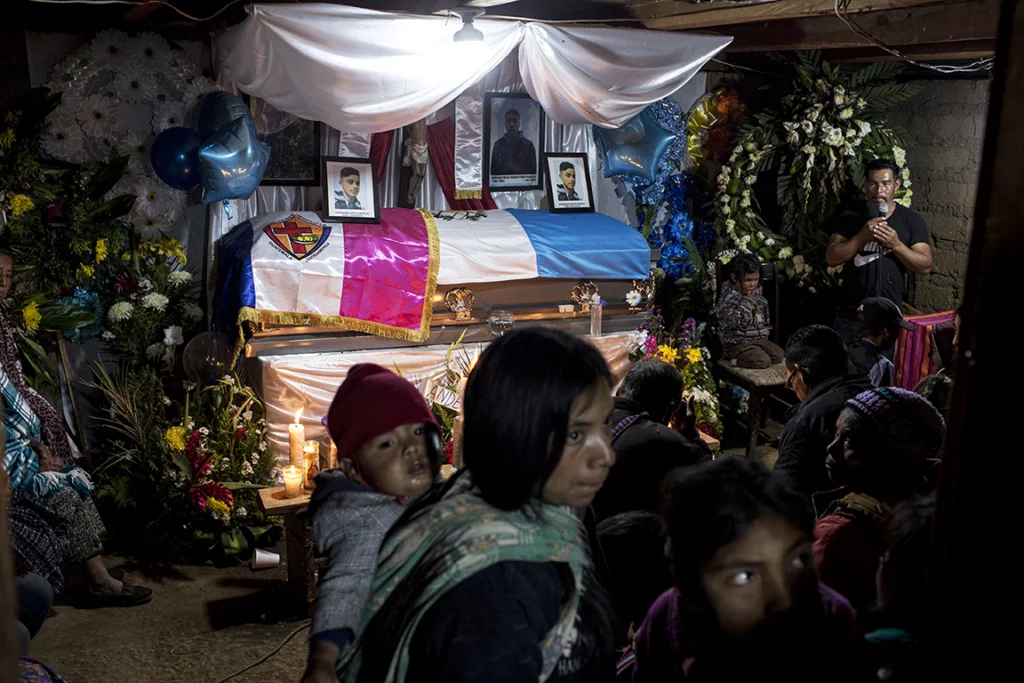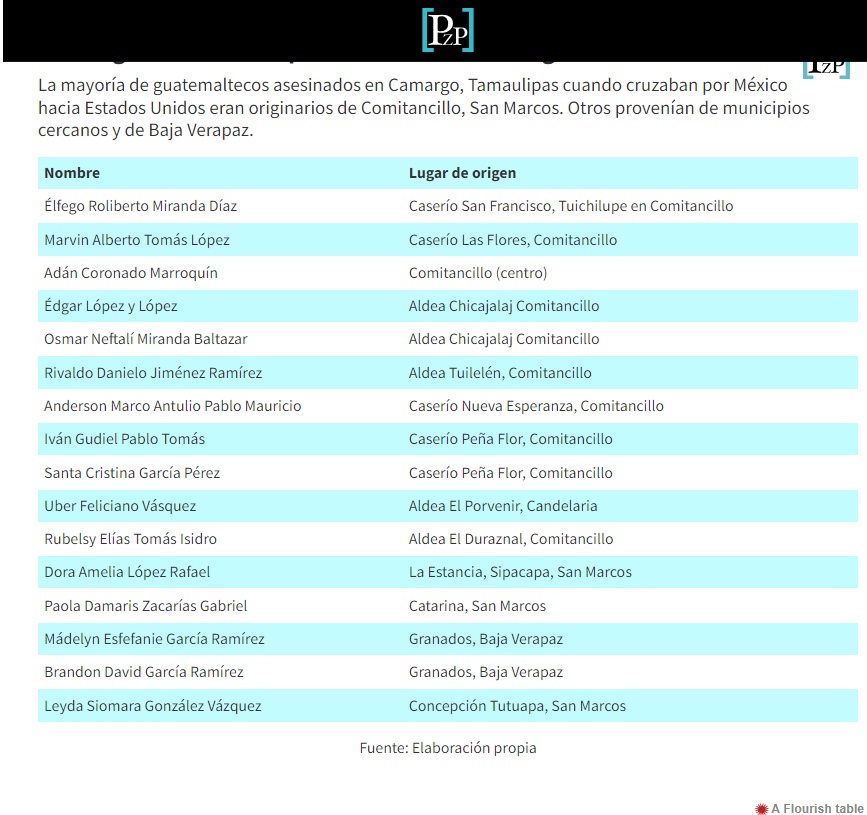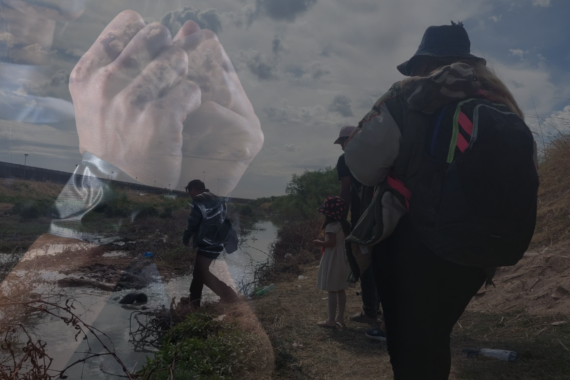Translated by Jesús Ronquillo / Circuito Frontera
Thirty-three months ago, 19 migrants were killed by Mexican police, who shot at them and then set their bodies on fire, in Camargo, Tamaulipas. Sixteen were Guatemalans. In a historic way, the case was sentenced. After this event, many things have changed, others have not. On the one hand, migration continues, but now there is a reason to trust in justice. The Jesuit Network with Migrants accompanied them on this journey and tells Plaza Pública about the complexities of this case.
This October 30, 2023, after more than two years of suspensions and delays, the unit trial judge of the Supreme Court of Justice of the State of Tamaulipas, Patricio Lugo, sentenced 11 Mexican state police officers to serve 50 years in prison for their participation in the massacre that took the lives of 19 people on January 22, 2021.
Click here for the Spanish version
Among the deceased, 16 were from Guatemala, one from El Salvador and two from México. According to information from the Attorney General’s Office, two of them were in charge of taking the migrants to U.S. territory.
For the Mexican justice system, this ruling was possible because one of the police officers who participated in the events, Ismael Vázquez, took advantage of the opportunity criterion and confessed to what happened that day. For his collaboration in the case, he was the only one sentenced to 19 years.
More than 60 testimonies and documentary evidence were presented to prove the guilt of the 12 accused. The accusations were: 11 accused of aggravated homicide, 12 of abuse of authority – crimes committed in the performance of administrative functions – and one for the crime of false reports given to an authority.
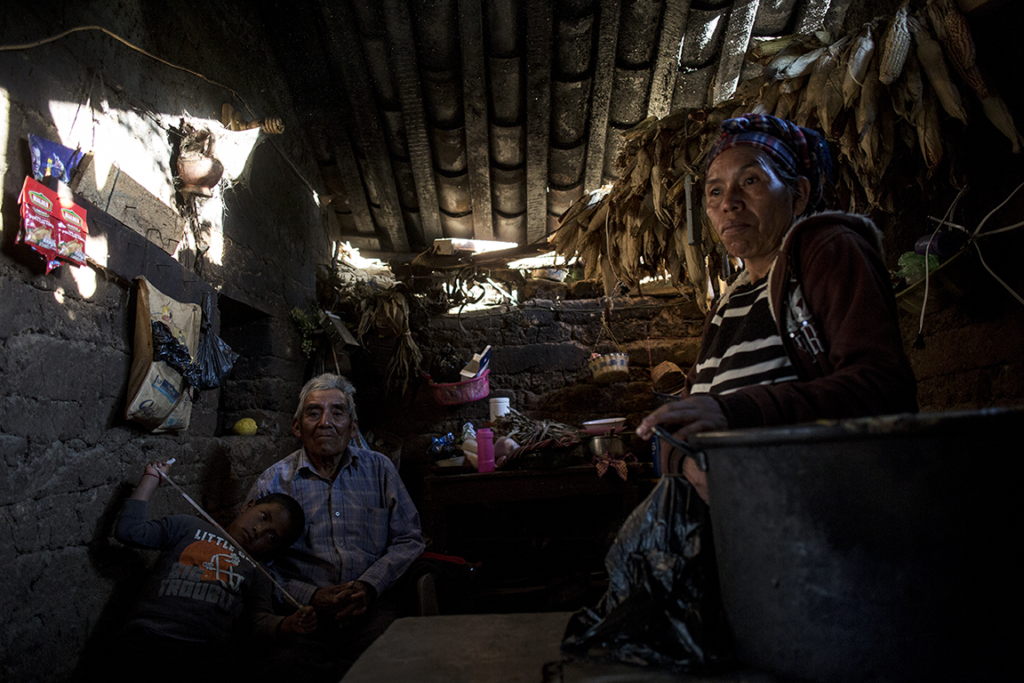
For both México and Guatemala, this sentence is emblematic and historic as it is the first conviction of state agents for a massacre of migrants.
From Guatemala, the lawyer of the Jesuit Network for Migrants (RJM), Ángel Escalante, has accompanied and provided legal advice to the families of the 16 Guatemalans who died, in conjunction with the Foundation for Justice and the Democratic Rule of Law, based in México.
As he explains, after the conviction the judge listened to the testimony of the families of the victims to determine the details of the sentence, as well as the reparation measures that the neighboring State should take in favor of the affected families.
A tragedy, two years ago
María Marcelina Mauricio, mother of Anderson Marco Antulio Pablo, recalls that she felt her “soul was ripped out” the day she confirmed that her son was one of the victims killed in the Camargo tragedy. At the time she was pregnant with her youngest daughter. However, the impact of the news had repercussions on her physical and emotional state, to the point of affecting the baby as well.
The child, doctors told her, would not live long. “I felt that my life no longer made sense without him, but thank God at this point I am still alive. It is very hard, very painful to be able to explain what we felt, what we have lived through all this time”, she recalls now, more than two years after that event.
Anderson Marco Antulio was 16 years old when he undertook the risky journey to the United States. So were 15 other Guatemalans. Most of them not older than 35, young men and women. Twelve of them were originally from Comitancillo, two more from nearby municipalities in San Marcos and another two came from Granados, Baja Verapaz.
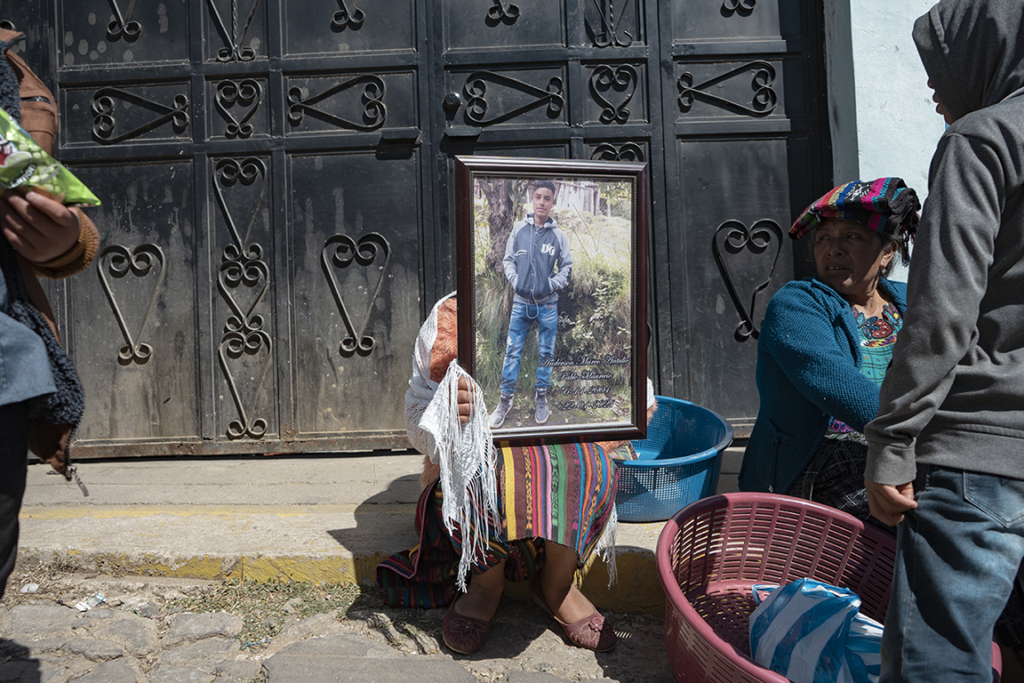
Given the lack of orientation and the need for support, the parents and relatives of the deceased requested the help of RJM, an organization that provides support to people in transit and that in addition to this case provides accompaniment to more families of Guatemalan migrants who have died in inhumane conditions. For example, on the occasion when more than 50 people died locked in a van that was abandoned in Texas, or in the fire that occurred in a migrant station in Ciudad Juárez.
The first thing the families asked for, recalls José Luis González, the Jesuit priest who coordinates the Network, was a prayer.
“Marco Antulio Pablo called us to see if we could support him and other families. We said yes and also asked him to confirm if they were his children. Why are you so sure it is them? We later found out why”, he says.
Both Marco Antulio and other family members had been in communication with their children, siblings and parents who were on their way to the United States. Some of them received calls and audios minutes before what happened. They were messages telling what was happening, how they were attacked with bullets and how they had been chased, some of them communicated while they were hiding in bushes.
The judicial process being carried out from Tamaulipas, México, confirms that, roughly speaking, what happened that day was that the group of migrants traveling in a pickup truck was chased by police, who shot at them more than a hundred times and subsequently burned the bodies.
They then returned to the scene to pick up the shell casings and attempt to alter the scene. To support this chronology, various pieces of evidence were heard and taken into account. The mobile devices of the police officers, to cite one example, proved through the GPS system that they were all present at the scene of the tragedy at the time the victims were killed.
Although the facts of that day are known, what is still unknown is the reason that motivated the police officers to act in that manner. The Tamaulipas Prosecutor’s Office has an open investigation against the intellectual authors; however, there are still no further details on this case.
Forgotten by the State
Comitancillo is one of the municipalities in the country where statistics and living conditions show that there, 250 km from the capital, the State has never invested.
According to the National Institute of Statistics (INE), in the rural area of the municipality, nine out of 10 people live in poverty. In addition, the municipality has the lowest Human Development Index in the entire department of San Marcos.
The lands are mountainous and grow food crops such as beans, corn, peaches, apples, among others. But beyond that, economic alternatives are limited.
For example, González says, for many years the communities have been asking for an institute so that through technical careers young people can develop skills and work in their place of origin. However, their requests go unheeded and beyond field work, there are not many opportunities for development.
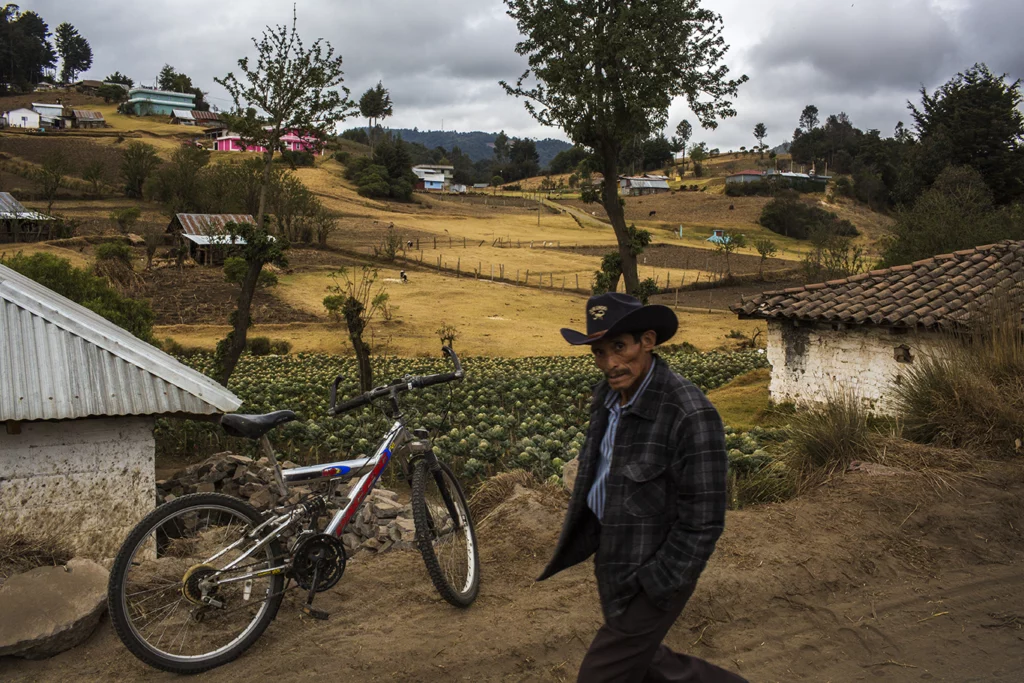
“The massacre did not stop the migration from Comitancillo. Almost all the families of the victims have siblings who in these two and a half years, in spite of the sadness that it caused to their parents and the fear that something similar could happen, have traveled and are already in the United States, they have managed to pass”, explains the Jesuit priest, with the property of someone who for more than two years has been close to the 16 families of the murdered migrants.
One of the mothers who mourned the death of her son in Camargo undertook the same journey two years after the event. Migration in recent years, González says, has been savage and the massacre has not stopped it.
In Comitancillo, families have at least six members. And most people have only five years of schooling, according to official data.
In the list of the victims of the tragedy in Camargo, the majority were residents of Comitancillo. Four of them came from the municipalities of Catarina and Concepción Tutuapa, San Marcos; and Granados, Baja Verapaz. Similar places in terms of development limitations.
Otilia Agustín Pérez, RJM psychologist, approached the families of the deceased to accompany them in their mourning process and observed the emotional implications of the lack of growth opportunities in the region.
“We see that the parents feel a lot of guilt for having given them permission or for not having the economic conditions to be able to support them in their studies or in some entrepreneurship, for example. So this is the reality, not only in Comitancillo but also in other places”, he explains.
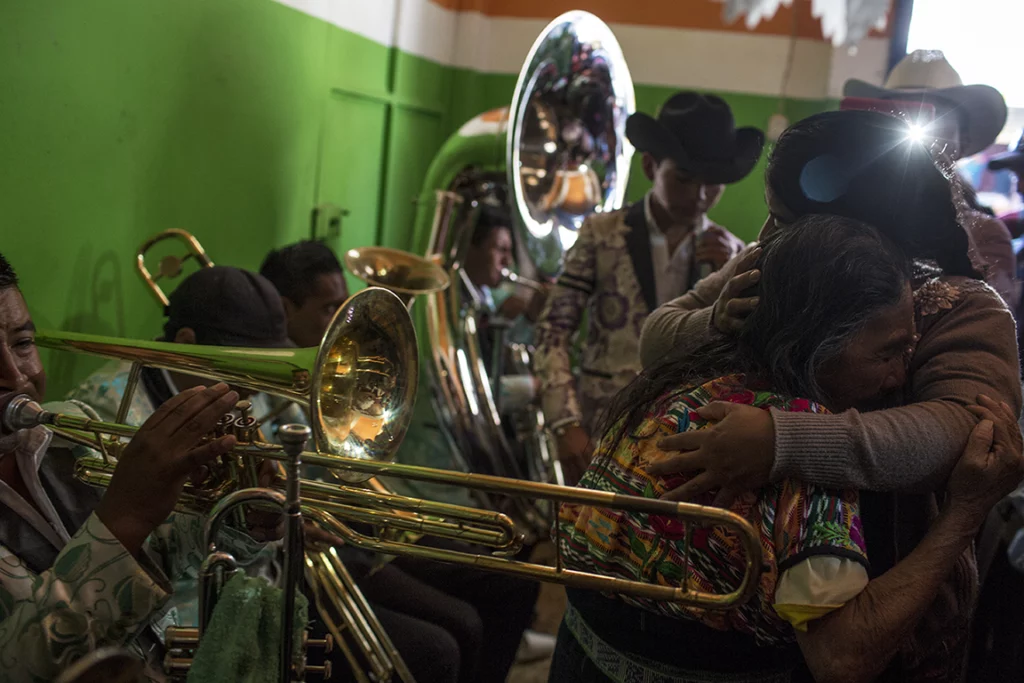
The tendency among young people in Comitancillo, as well as in other parts of the country, is that a fundamental part of their life projects is to migrate in order to help their families economically. This desire increases when they realize how much better life is for their neighbors or relatives who have already migrated.
However, the dream is not only limited to having material goods but also to the desire to live in dignified conditions and have access to basic services such as health care. Santa Cristina García Pérez, for example, 20 years old, was one of the victims in Camargo and her main motivation for leaving Guatemala was to look for a job with which to pay for an operation to correct her younger sister’s cleft lip.
Behind these truncated projects, González believes, there is a great responsibility of the State for not guaranteeing the conditions for adequate development.
Two years in search of justice and resilience
The last 33 months have been a struggle for the 16 families to be heard and to have access to a justice system that is not prepared to adequately include them in these processes. The fathers, mothers and even siblings have been able to stay informed and kept abreast of progress in identifying those responsible for what happened thanks to the legal accompaniment provided by RJM in Guatemala and the Foundation for Justice and the Democratic Rule of Law, which works from México.
From the State of Guatemala, neither the Ministry of Foreign Affairs nor any other entity provided them with this service, despite the fact that in 2021, President Alejandro Giammattei made a series of offers to the families and assured that they would receive accompaniment from the government.
But that support received lasted only a few months. “Their help was basically with the transfer of the bodies to their communities for burials, but afterwards there were very curious things. For example, in a workshop we held with the families, the Ministry of Agriculture intervened to talk to the family members and gave them a small bag of seeds, which fit in each one’s hand. They were very surprised”, says González.
In the absence of the State, it was the solidarity of the people of Comitancillo, and even the economic support of migrants living in the United States, which helped the families to improve conditions in recent years. Thanks to this, they have all received help to build houses and improve their quality of life. Santa Cristina’s sister, for example, underwent surgery after the tragedy, when the news reached the ears of health professionals.
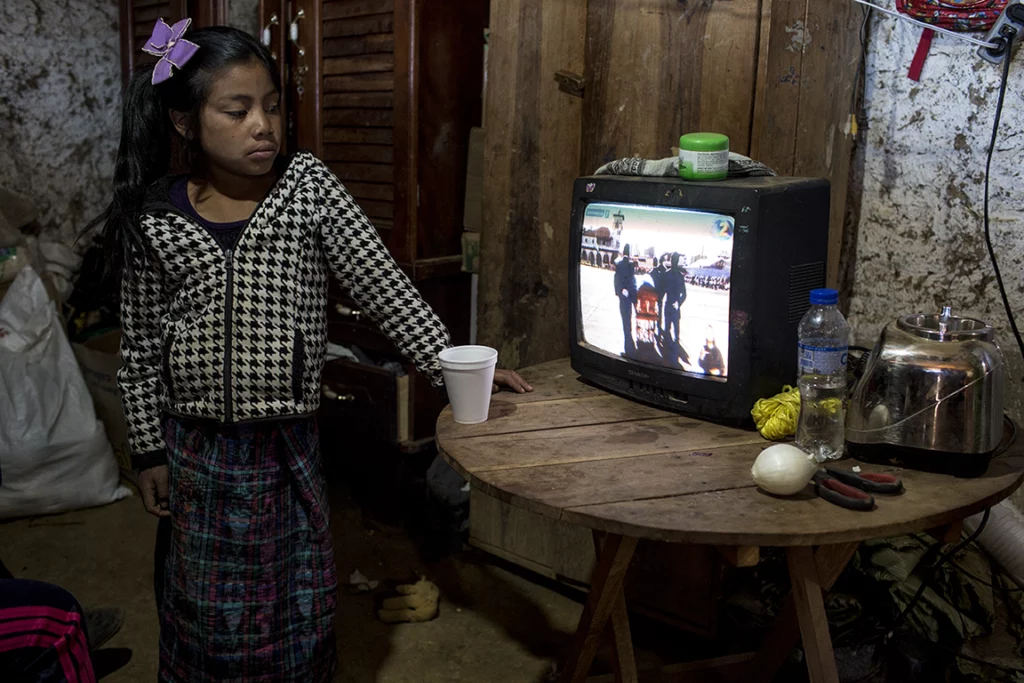
Since the events, investigations have been launched in Mexico to determine responsibility for these murders. In Guatemala, on the other hand, the Public Prosecutor’s Office (MP) disassociated itself from the investigation, arguing that since the events occurred in another territory, it was not within its competence to investigate. However, they did carry out operations to identify the “coyotes” working in the Comitancillo territory.
Having access to the judicial process was the first major challenge faced by the families. Many of them are people whose main language is not Spanish, in addition to the fact that they had no previous experience or knowledge of such a process. The first reaction of the families to what happened was resignation and apathy. They only wanted to receive the remains of their loved ones, give them a dignified burial and try to move on with their lives.
A few others insisted on the importance of clarifying what happened to prevent something like this from happening again.
In addition to that, due to the fact that at a national level the culture of denunciation is not the predominant one, neighbors and other relatives questioned the need to “wear themselves out” in a trial to achieve justice.
“They felt discouraged because in their community they were told: “Why do you have to go through this very tiring process? Leave your family member in peace, don’t go through this process because it will lead to many illnesses,” says the psychologist who has accompanied them to date.
There was also fear that the resolution of the case would not be favorable for the victims and that there would be reprisals for the family members. “The parents thought that if they lost the case and the police went free, they would come after them. In this process they had to deal with a lot of anguish and anxiety, hours and nights without being able to sleep”, González said.
Depression, family disintegration, alcoholism, stress and even health problems affected them. Marcelina’s case is an example of this. When her youngest daughter was born, there were not many life expectations for her. Bringing her back to health was not easy; however, today she is a two-year-old girl who plays and laughs while her parents, Marcelina and Marco Antulio Pablo, remember how hard the journey to a conviction was.
“Remembering this tragedy makes us nostalgic, says Marco Antulio, migrating is not a crime, it is a right, but unfortunately people feel they are the owners of a country, we are not”.
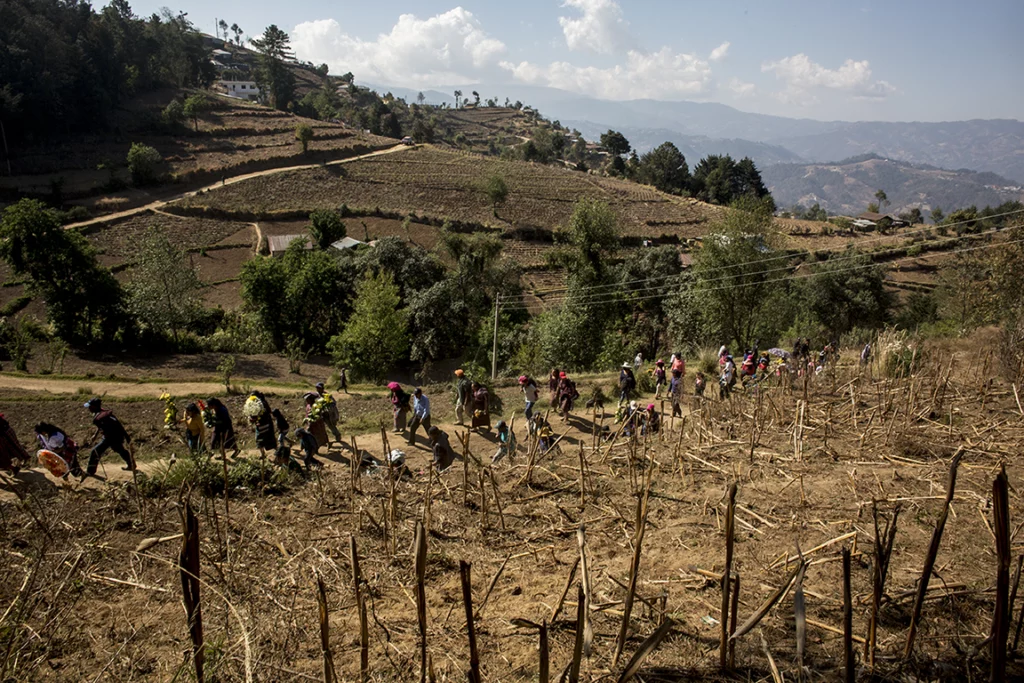
In the trial from México, as constantly happens also in Guatemala, there were a series of delays to entrap the process. Because the hearings were being held in Tamaulipas, the judge in charge authorized the families to participate in them by videoconference.
That way they could keep abreast of the progress. Attorney Escalante relates that it was not the State that provided the space and resources for the families to connect to the hearings, but the RJM, who became the legal advisors of the families from the first days after the tragedy, with the support of the Foundation for Justice.
On numerous occasions, the hearings were suspended or interrupted for various reasons. Due to the precariousness of the roads, which are dirt roads in mountains far away from the urban center, for the families to travel from their homes to the center of Comitancillo implied a significant investment of time and resources.
Attending the virtual hearings, therefore, meant sacrificing a day’s work and spending money on transportation. For these reasons, explains Marco Antulio, this process felt like an uphill struggle, where everything seemed to be against the families.
“The distances and economic shortages of the families were so evident that some people had to travel two to four hours to get to the place chosen for the hearings, others had to pay for a private vehicle to take them to the center of Comitancillo, which represented an expense of between 100 and 300 quetzales per person. In addition, losing a full day’s work meant not receiving 50 to 100 Quetzals per person”, explains the lawyer on the case.
However, in this back-and-forth, the families formed a support group among themselves so as not to become discouraged and to understand the stages of the trial together. They also understood the importance of reaching a sentence, with the sole purpose of obtaining justice and above all to prevent this from happening again.
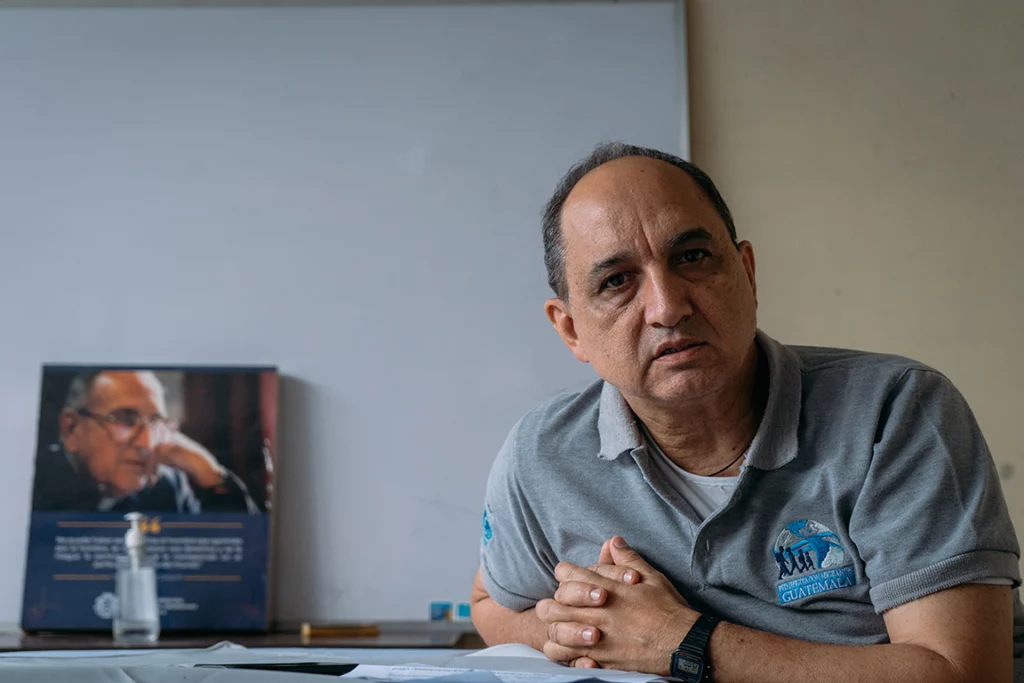
“Today I think they can talk about the case and I perceive a lot of resilience. One of them told me on one occasion: ‘I have already forgiven, I am not happy to know that the policemen are going to be locked up for so many years because I imagine that they also have children, but I understand that they have to pay. The process is for justice, it is not revenge”, says González.
A landmark sentence
In the morning hours of October 30, Judge Patricio Luego read and explained his final sentence. Of the 12 police officers involved, 11 were sentenced to 50 years in prison for homicide, abuse of authority and crimes in the performance of administrative duties.
One of the defendants, Mayra Vázquez, was also sentenced for falsification of reports given to the authority. She was the one who made the police report, which had a series of inconsistencies. In México, the prosecution requested a sentence of 50 years for each victim; however, the country’s legislation establishes that figure as the maximum sentence.
Agent Ismael Vázquez, 28 years old, was the key piece of the investigation because his statements disproved the false reports and testimonies of his colleagues.
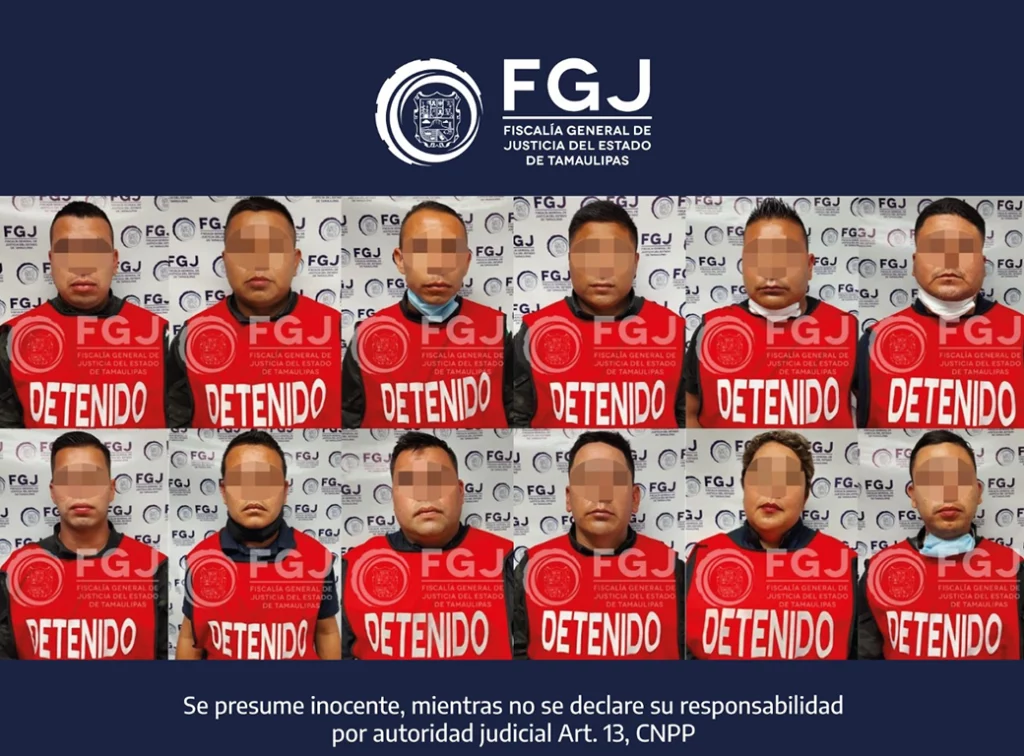
In the sentence, which is a little over 1,000 pages long, the families were ordered to pay 335,709 Mexican pesos -about 145,000 quetzales- for each victim. In addition, the sentenced persons were disqualified from holding public office for eight years. As of today, the defense attorneys have ten days to present pleadings and request the reinstatement of the trial. Some of them have already expressed their intention to do so.
There is no exact record of how many Guatemalans die on their way to the United States, due to the subhuman conditions in which they travel, attacks by organized crime, police abuses, kidnappings or assaults, among other circumstances. In recent years, tragedies of this magnitude have not ceased to be recorded. But none of these deaths has been solved, much less resulted in a conviction.
“Of all the massacres, -explains González-, this is the first sentence and that indicates that justice arrives but that it is necessary to have an alliance of organizations such as governments, justice and, above all, to have unity among relatives of the victims, which we believe has been the most important of this process”. It was partly a coincidence that most of the victims are from the same municipality, Comitancillo, and this facilitated a certain unity among the relatives.
This sentence is considered a historic achievement that leaves an important precedent for not allowing any more impunity in these cases.
In this tragedy, González adds, the perpetrators were police officers and therefore the State is implicated, it is responsible for what happened. This also makes it an emblematic case.
Since this event, many things have changed in Comitancillo. Others have remained the same.
On the one hand, migration does not stop, it has not even diminished. But today it is not breathing the same air, today those who were skeptical and questioned the effort of the families, to seek justice and assume the wear and tear of a trial of this level, have a reason to trust that there can be no impunity for the death of migrants.
“Just by having achieved the ruling, something very important has changed for Guatemala and the entire region, these cases cannot be allowed to go unpunished. A few months ago such a ruling was unthinkable, because there have been previous massacres that are still awaiting a resolution”, explains the RJM coordinator.
Before, the families complained about the time lost between suspended hearings. Today, they assure that their presence and persistence was important to reach this final stage.
“The conception of justice in the families and in the community has changed a lot. People who used to tell them that why go and they would not achieve anything now have a reason to believe in justice”, reflects Otilia Agustín.
CREDITS:
Author: Kimberly Rocío López
With information from: Perla Reséndez López
In collaboration with: Border Hub
Editing: Eswin Quiñonez





